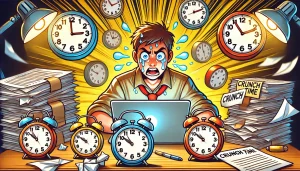Ever felt the pressure of a looming deadline? Welcome to “crunch time”!
A short, intense period when you must work very hard to finish something important before a deadline. It’s the final push to get things done under pressure.
Have you ever misinterpreted “crunch time” as snack hour? You’re not alone! This common English idiom actually refers to high-pressure moments when the clock is ticking.

Understanding “crunch time” can enhance your communication skills in various settings, from offices to sports arenas.
This post will unravel the true meaning, origin, and usage of this phrase, helping you sound more natural in English conversations.
Understanding This Idiom
“Crunch time” may sound like a break to eat something crispy, but the truth is far from a casual snack. This idiom points to a high-pressure period, often right before a deadline, where intense focus and effort are required.
Sometimes it’s seen in work projects with tight timelines. Other times, it pops up during sports events when only a few minutes remain on the clock.
Definition of “Crunch Time”
“Crunch time” generally refers to a period of heightened urgency and effort:
- It’s when you must work swiftly to meet an important deadline.
- Pressure is high, and every moment counts.
- The term often appears in offices, schools, or any setting where time is critical.
Think of a software company racing to finalize a new product before its launch date. That last stretch of intense effort is what many call “crunch time,” meaning success hinges on efficient, focused work.
Real-World Examples
- Office Deadlines: When a manager says, “It’s crunch time on this project,” they’re announcing that all hands should be on deck to complete tasks promptly.
- School Assignments: Students often face “crunch time” the night before a big exam or final paper, working diligently to finish on time.
- Event Planning: An organizing team might mention “crunch time” when the event date is just around the corner, indicating everyone must handle last-minute details quickly.
Without knowing this idiom, you might misinterpret the situation and wonder why nobody else is taking a snack break.
Once you understand it, however, you’ll recognize that “crunch time” is about zeroing in and taking decisive actions before the clock runs out.
Funny Story
Imagine someone new to a corporate environment hearing, “It’s crunch time!” for the first time. They walk into the meeting room with a bowl of potato chips, hoping to share some laughs and snacks.
Instead, they find colleagues intently typing, hurriedly making phone calls, and revising documents under serious pressure.



It’s an amusing misunderstanding, yet an excellent reminder that idioms can catch you off guard if you’re not familiar with them.
Everyday Usage
“Crunch time” doesn’t just belong in the office or the classroom. You might hear it anytime people face tight schedules or high-stress tasks.
Even a casual sports fan might exclaim, “This is crunch time!” in the final moments of a closely contested match. The phrase instantly conveys the importance of what’s at stake and encourages heightened focus.
Similar Expressions
While “crunch time” has a distinct ring, there are a few similar ways to describe high-pressure deadlines:
- Deadline pressure: Emphasizes the stress of an upcoming due date.
- Time crunch: Implies there’s little time left to achieve the goal.
- Final push: Suggests a last burst of energy before crossing the finish line.
These expressions carry the same urgent vibe, making them handy alternatives in conversation. Use them to avoid overusing “crunch time” when you want variety in your vocabulary.
Opposite Expressions
In contrast, some phrases focus on having plenty of time or moments of relaxation:
- Leisure time: A calm period to do what you please without deadlines.
- Downtime: A break from intense work, often used in professional settings.
- Free time: An unstructured period when you’re free from obligations.
These expressions depict a laid-back atmosphere rather than a tense countdown. They’re useful for describing moments of rest following a demanding project or when discussing your schedule.
Rephrasing Sentences
Sometimes, you may prefer a more direct style, especially for professional writing or clear instructions. Here’s how to transform “crunch time” statements into plain language without losing their meaning:
- Original: “It’s crunch time for the team as the project deadline is approaching.”
- Rephrased: “The team must work quickly and efficiently to meet the upcoming deadline.”
- Original: “She’s facing crunch time on her presentation.”
- Rephrased: “She needs to finalize her presentation under tight time constraints.”
Tips:
- Identify the core urgency you want to express.
- Use synonyms like “strict deadline,” “pressing timeline,” or “urgent phase.”
- Maintain context so your reader or listener understands the need for swift action.
A Real-Life Story
Picture a group of engineers assigned to deliver a critical project in a limited timeframe. They each have specialized tasks, from coding to hardware testing, and each milestone needs to align perfectly.
With just days left before the final presentation to stakeholders, tensions run high. The team works late, double-checking every detail.
Eventually, they pull it all together just hours before the deadline. This dedicated push exemplifies “crunch time”—a stage requiring absolute commitment and resilience.
When they succeed, leadership often recognizes their determination. In many environments, praise follows once the dust settles, showing that “crunch time” can bring camaraderie and a sense of shared accomplishment.
Related Idioms
Idioms often revolve around the theme of deadlines and time pressure. Here are a few that blend well with “crunch time”:
“Beat the Clock”
- Meaning: To finish a task before time runs out.
- Usage: “We need to beat the clock if we want to finalize the proposal before next week.”
This phrase depicts a race against time, much like a basketball team scoring in the final seconds. It resonates with scenarios where completing a task early or on time is crucial.
Key Takeaways:
- “Beat the clock” highlights the urgency to avoid running out of time.
- It can be especially motivating when you want to energize people around you.
Pop Quiz: Check Your Idiom Skills
Crunch Time

Conclusion
Understanding “crunch time” gives you an edge in everyday conversations, workplace discussions, or academic settings. It signals to others that you grasp the urgency of a situation and are prepared to handle it.
Whenever you hear coworkers or friends proclaim “It’s crunch time,” you’ll know they’re calling for focused effort and a strategic plan to finish strong.



Using ‘crunch time’ correctly in conversation shows you understand English nuances and helps you connect with native speakers!
If you’re feeling the tension of a closing deadline, you can declare it “crunch time” to rally your peers or energize yourself.
Just remember that it’s not about munching on snacks but about rising to the occasion with determination and speed.
Keep practicing these idiomatic expressions, and soon they’ll become second nature. The more comfortable you are with English idioms, the more effectively you can communicate in both professional and everyday settings.









Comment